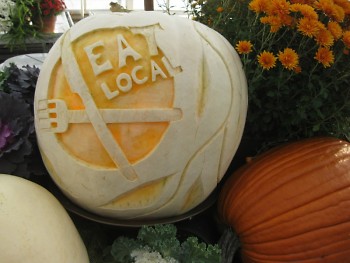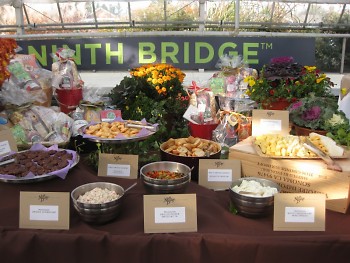“At home I serve the kind of food I know the story behind.”
~ Michael Pollan
Food activist Michael Pollan isn't alone: knowing the story behind the food we eat is important to a growing number of Grand Rapidians as well, as the turnout at last Wednesday's Local First Fork Fest showed. More than 300 locavores attended the final segment of the local business advocate's Eat Local Challenge, their August-October series of events and programs promoting food sustainability in West Michigan.
Fulton Heights' Romence Gardens hosted the food-fest in the bright, airy space of its greenhouses, an apt venue with a farmers market feel. The third-generation business' six-acre urban farm and ties to Local First made it a natural setting for the event. “We support the whole concept of Local First, and helping to get the word out about local food,” said Mary Romence, whose duties include events production at the plant retailer and seed nursery. Mary's daughter Katey had a hands-on role in planning the festival layout. “I got to make it pretty,” she laughed, adding, “It's great to see so many people come out to support local eating. And the restaurants outdid themselves with their displays.”
Colorful it was, with Romence lending their ample stores of flowers, fruits, and vegetables as décor accessories to local growers and restaurants crafting table layouts. A walk through the vibrant tableau was a feast in itself, with the visual aesthetics of the specialties complementing their epicurean richness.
More than twenty-five food and beverage producers, retailers, and restaurants presented at Fork Fest 2011. The standout samples ranged from simple to complex, with a spectrum of innovative forms in between. The Starving Artist's Chef Torrence O'Haire showcased an English-style blood orange marmalade made with Tahitian vanilla paste using Beanilla beans. Brewery Vivant paired its Belgian ales at the cash bar with onion-laden French ham hock briette on its table by the main aisle. The Bob mixed elegance with inventiveness via mini-servings of warm white pumpkin soup under the shadow of multi-colored cantaloupe popsicles. Making Thyme scored points on moist Jalapeno Cheddar cornbread with honey butter, while the Art of the Table highlighted cheeses from Dancing Goat Creamery and its own fusion of Reny Picot brie with Cherry Republic cherry jam. Thrown into the cornucopia were demitasses of Mad Cap coffee, gourmet chocolate cupcakes from Little Pearl capped by frosting imbued with Founders stout, and rich grains from Lubbers Family Farm's Little Rooster Bread Company.
A number of sustainable-food players in attendance were there for the first time: Earthkeeper Farm from Kent City; Twisted Rooster Restaurants; Creswick Farms of Ravenna, offering grass-fed meat and poultry; and Wealthy Street's new Nourish Organic Market, to name a few. Newer and veteran members of the local-source community mixed together, presenting both modern twists on traditional services and simple, time-honored fare. Doorganics organic home-delivery service and West Michigan Coop's online farmers market set up not far from Ada's venerable Seitsma Orchards, which showed up with an array of apples and ciders to cleanse the palate between nibbles.
Local First Executive Director Elissa Hillary framed Fork Fest 2011 in context: over the past five years of Eat Local Challenge efforts, farmers markets in the city have grown from five to fourteen, mirrored by an attendant rise in new dairy and organic food producers. This fall alone, an estimated $16,000 has been pledged by individuals toward the purchase of local foods through the ELC's 10x10 program. Viewing this, it becomes clear that the landscape of the area's food economy has changed. Hillary affirms this. “Five years ago, few local restaurants bought local food. We've helped to significantly shift that market away from imported food toward support for local producers.” Challenge goals for the future include efforts to extend the growing season beyond the three-month period common to this region, and a further build-out of system infrastructure between producers and retailers.
For its part, Romence Gardens entertains the possibility of staging further events of this kind, at times when they can balance public gatherings within an operating business space. “Working with Local First is a dream,” said Katey Romence. Hopefully for local food lovers, that dream will be repeated in future offerings of this sustainable smorgasbord.
The Rapidian, a program of the 501(c)3 nonprofit Community Media Center, relies on the community’s support to help cover the cost of training reporters and publishing content.
We need your help.
If each of our readers and content creators who values this community platform help support its creation and maintenance, The Rapidian can continue to educate and facilitate a conversation around issues for years to come.
Please support The Rapidian and make a contribution today.



